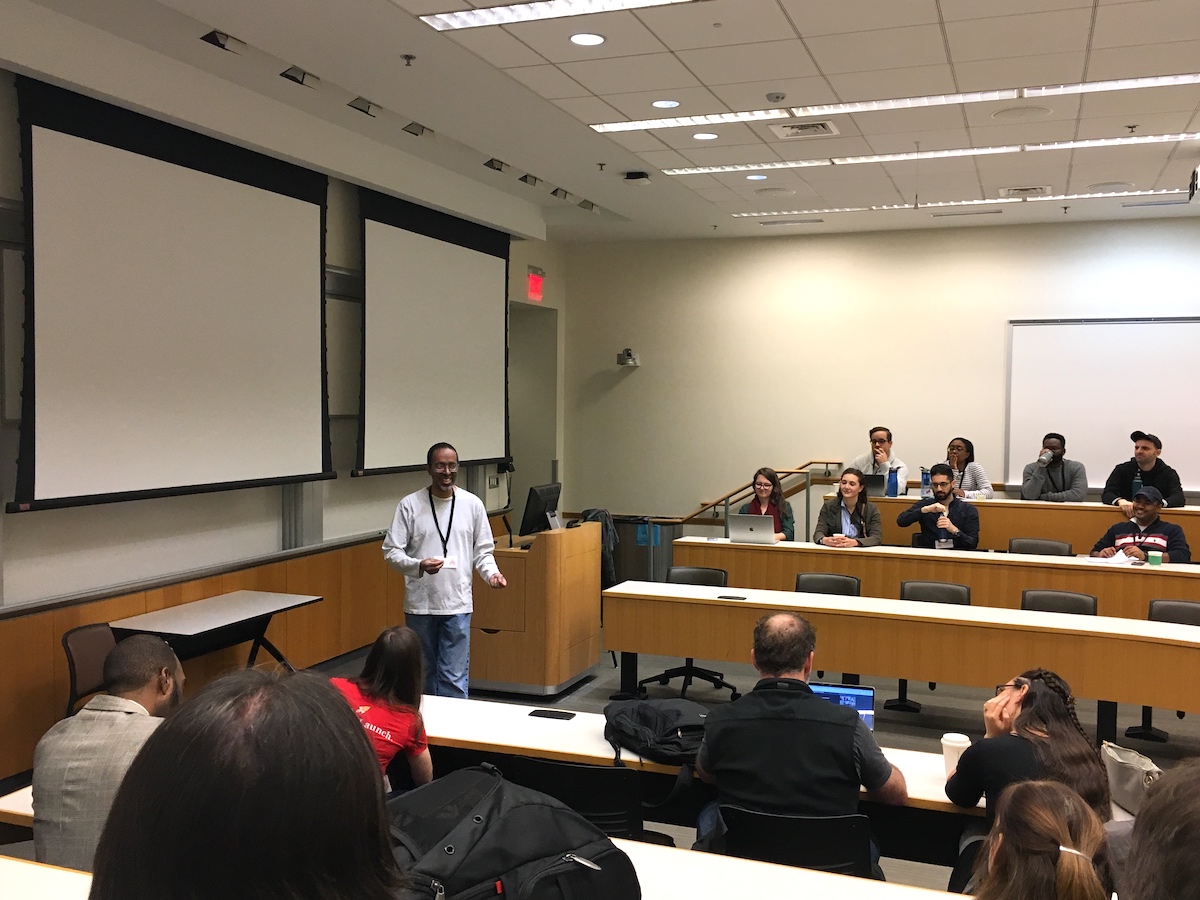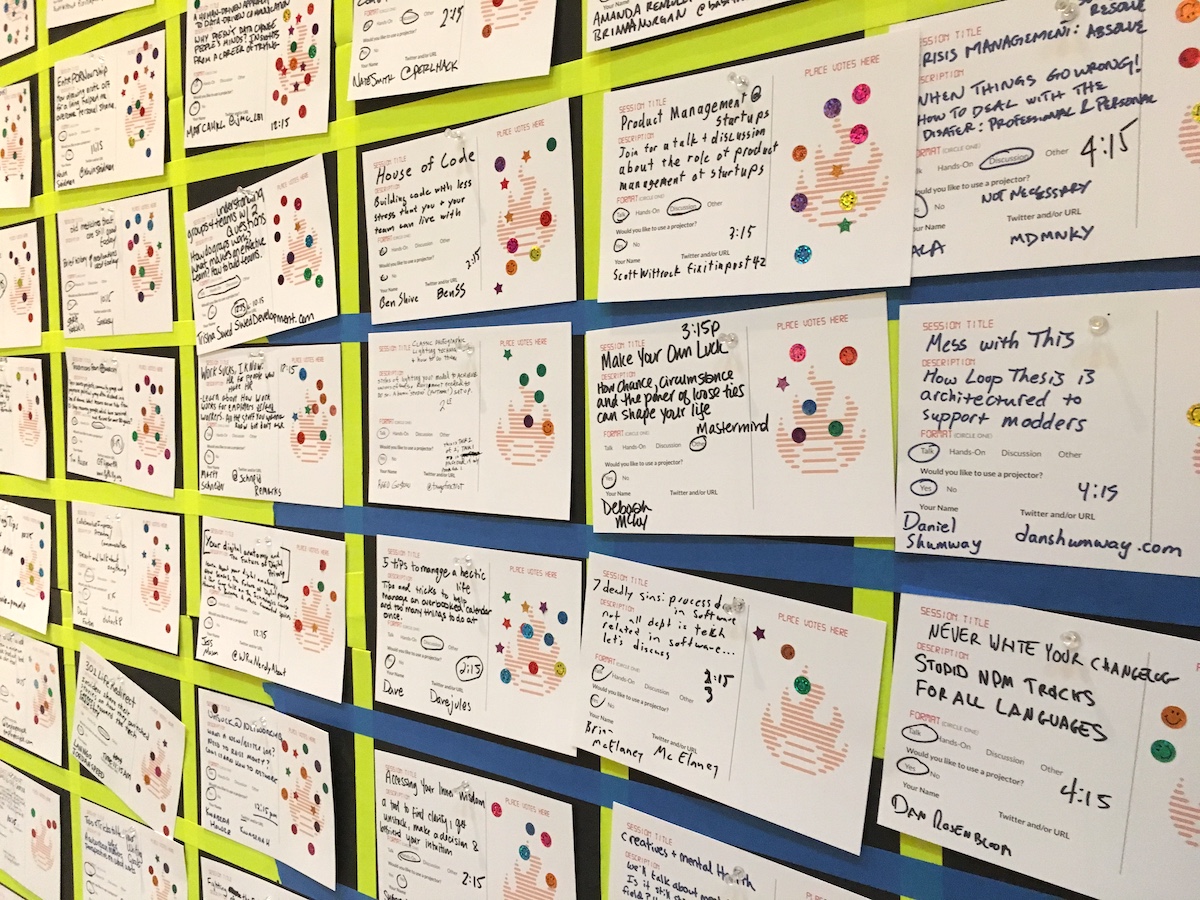Though its developer focus was still very much intact, the 12th edition of BarCamp Philly felt more like a self-love and empowerment fest at University of Pennsylvania’s Huntsman Hall this past Saturday, where creators and innovators were encouraged to build upon their strengths and disrupt oppressive systems that prevent great work from being realized and released into the world.
From Sherry Ezuthachan’s call to reconnect with the creative fire within during “Accessing Your Inner Wisdom” to BarCamp co-organizer Amanda Renzulli’s interactive, solutions-based discussion “When the Macro Sucks, Focus on the Micro,” attendees were inspired by affirming calls-to-action and strategies for self-paced success during the popular annual unconference where new talks are born sometimes moments before they are presented.
Here are four lessons that resonated:
Presentations are performances, and good performers rehearse.

David Dylan Thomas. (Photo by Marta Rusek)
Before he became a highly sought-after presenter and content strategist, David Dylan Thomas was a comic book-loving kid who discovered presentations were an escape from bullying while he was in school. “No one bullied me while I was presenting about dinosaurs and rockets,” he shared.
In the years since, Thomas has come to view presentations as performances. His secret to presentation success? Rehearsal.
“Performers rehearse,” he said during his informal talk, “Public Speaking Tips.” The most memorable and effective presentations require careful planning, timing and yes, choreography. How you present matters as much as what you present.
Lead with the positives and stop handing out insecurities.
Writer and branding consultant Nicole Hallberg has earned most of her client relationships from direct networking at events and through referrals, though not without hiccups along the way.
“Many clients are coming from a place of anxiety, so lead with a positive [when describing your work],” said Hallberg, whose presentation “How I F@#!ed up While Running My Small Biz So You Don’t Have To” shared horror stories to save freelancers from errors that could cost them time and paychecks.
Her trick is involves listening to clients talk about their pain points, then identifying her services as an investment worth making.
“Instead of saying ‘I know my services are expensive, but …’ say, ‘You focus on running your business and bringing in more clients,” she said. “Leave the blogging to me so we can leverage your experience into speaking engagements and more clients.’”

Nicole Hallberg presents “How I F@#!ed Up While Running My Small Biz So You Don’t Have To.” (Photo by Marta Rusek)
When the going gets tough, turn to your team.
In addition to sharing a multitude of productivity tools during his presentation, “5 Tips to Manage a Hectic Life,” Dave Jules of Tamman emphasized the importance of teams when crisis mode begins.
“Having everyone aligned on a mission or a goal is the most powerful thing you can do,” he shared.
So what happens when everything is always on fire, as one attendee asked? Focus on the most mission-critical issue, then let your team know that the pressure is coming down, Jules said. After all, it takes more than one person to put out the fire.
Each of us has a role in building the knowledge democracy.
Open access advocate Sarah Wipperman was brutally honest about the lack of solutions to the growing monopoly of major intellectual property holders like Disney.
“Copyright is a sword, not a shield,” she declared at the top of her talk, “Copyright & How It’s Destroying Society.” But Mickey Mouse & Co aren’t the only offenders: Publishers like Elsevier turned a 37% profit over unpaid work submitted to professional journals in 2018, she said.
Restricting access to information made possible by taxpayer-funded research is not only wrong, it stifles innovation and prevents scientific advances that can save lives, Wipperman said. Our best hope is facilitating a knowledge democracy, a world where regardless of where each of us lives, we have the same open access to information that can advance knowledge and change our lives for the better.
Join the conversation!
Find news, events, jobs and people who share your interests on Technical.ly's open community Slack

Philly daily roundup: Women's health startup wins pitch; $204M for internet access; 'GamingWalls' for sports venues

Philly daily roundup: East Market coworking; Temple's $2.5M engineering donation; WITS spring summit

Philly daily roundup: Jason Bannon leaves Ben Franklin; $26M for narcolepsy treatment; Philly Tech Calendar turns one

